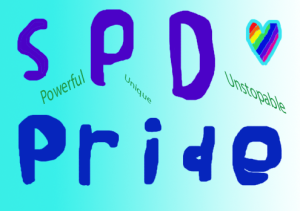You call me high-functioning because I can speak in words, and you say I’m articulate
But that doesn’t account for the times when the words get trapped inside of me, and speaking seems as hard as running a marathon.
You call her low-functioning because her voice is hard to understand
But she has just as much to say as I do; you just have to listen.
You call her low-functioning because you see her rock her body and flap her hands
But you don’t think about the joy this brings her, how satisfying it is to move to the beat of her mind.
You call me high-functioning because you don’t see me playing with my hands under the table
But you don’t know how much I want to rock and flap just like she does, how it makes me feel finally comfortable in my own skin.
You call me high-functioning be cause I can socialize
But you don’t see my constant internal prompting of what to say, the years it took me to get to this point, or the internal agony when I think I’ve made a mistake.
You call her low-functioning because she often repeats the same phrases over and over again
But you don’t see the meaning in these phrases, or the way she uses them to communicate.
You call me high-functioning because I can go to social events
But you don’t see the exhaustion that comes afterward, and the toll that takes over time.
You call her low-functioning because she melts down, yelling and banging her head on the ground
But you don’t see how hard she has been trying all day long to hold together.
You call me high-functioning because you don’t see me cry and scream
But that’s because I’ve internalized, and my meltdowns happen when the world becomes too fast and swirling and nothing makes sense any more.
You call her low-functioning because she loves to talk about one TV show, and hardly ever talks about anything else
But you don’t see how much joy this brings her, and how it has allowed her to connect and make friends.
You call me high-functioning because I can talk about things I’m not interested in
But you don’t see the pure joy of infodumping about my interests, and how painful it is to keep that all inside
You call her low-functioning because you knew right away that she was not the same
You call me high-function because you never would have known anything was different about me if I hadn’t told you
But maybe I’m tired of the sameness.
High-functioning is not a compliment
When all you’re doing
Is comparing me to her.
(Originally published on my tumblr blog.)


